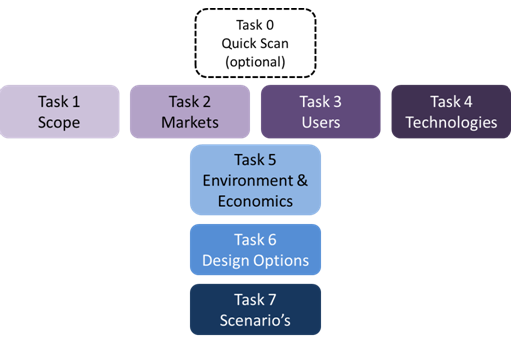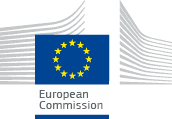Methodology summary
This preparatory study is conducted using the Methodology for Ecodesign of Energy-using products (MEErP) as established in 2011. This methodology was developed to allow evaluating whether and to which extent various energy-related products fulfil certain criteria according to Article 15 and Annex I and/or II of the Ecodesign Directive that make them eligible for implementing measures. This methodology requires the contractor to carry out 7 tasks, ranging from product definition to policy scenario analysis.
The tasks in the MEErP entail:
- Task 1 – Scope (definitions, standards and legislation);
- Task 2 – Markets (volumes and prices);
- Task 3 – Users (product demand side);
- Task 4 – Technologies (product supply side, includes both BAT and BNAT);
- Task 5 – Environment & Economics (Base case LCA & LCC);
- Task 6 – Design options;
- Task 7 – Scenarios (Policy, scenario, impact and sensitivity analysis).
Tasks 1 to 4 can be performed in parallel, whereas 5, 6 and 7 are sequential. Task 0 or a Quick-scan is optional to Task 1 for the case of large or inhomogeneous product groups, where it is recommended to carry out a first product screening. The objective is to re-group or narrow the product scope, as appropriate from an ecodesign point of view, for the subsequent analysis in tasks 2-7.

Figure: Task of MEErP
FAQ
The section below discusses some important elements of the tasks of the study:
- What are Energy-related products as defined in the Ecodesign directive?
- Why should stakeholders be involved?
What are Energy-related products?
Directive 2009/125/EC provides the following definition of energy-related products:
Article 2, item 1: "Energy-related product means any good that has an impact on energy consumption during use, which is placed on the market and/or put into service ...(including parts) ... of which the environmental performance can be assessed independently."
Why should stakeholders be involved?
The Commission is dedicated in giving stakeholders the opportunity to provide input to this study thereby creating a fully transparent and open process. This website is the main information exchange platform between the study-team, the Commission and the stakeholders.
All (draft) documents will be freely available through this website, but if you register as stakeholder you will receive notifications on website updates. Furthermore, as stakeholder, you can provide direct feedback to draft reports published on this website and make suggestions for energy-related products. Please note that your comments and suggestions may be made public on this website.
When most of the task reports are available a meeting with stakeholders will take place. The meeting date, venue and how to be invited to the meeting will be timely announced through this website.
